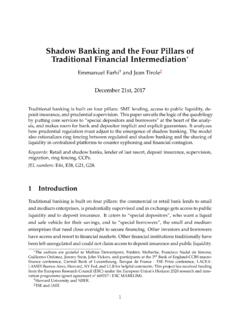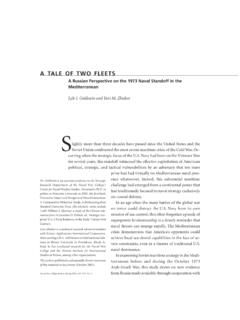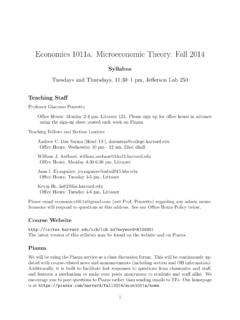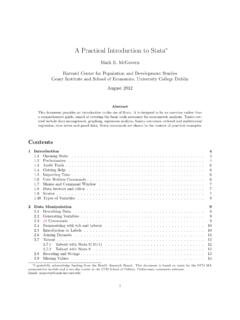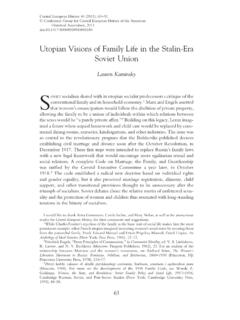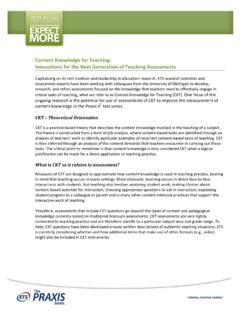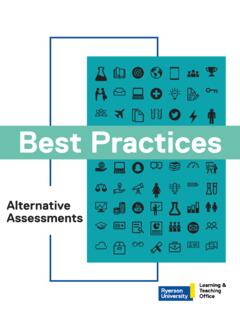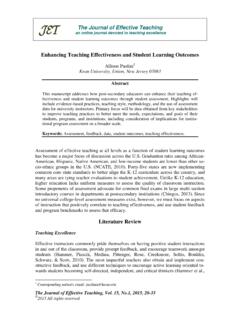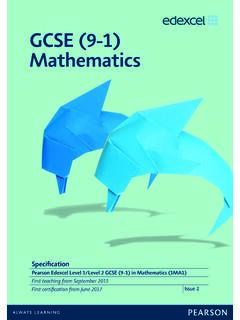Transcription of Teacher and Teaching Effects on Students’ Attitudes and ...
1 Teacher and Teaching Effects on students ' Attitudes and Behaviors David Blazar Harvard Graduate School of Education Matthew A. Kraft Brown University Suggested Citation: Blazar, D. & Kraft, M. (2017). Teacher and Teaching Effects on students ' Attitudes and behaviors. Educational Evaluation and Policy Analysis, 39(1), 146-170. Link to Publisher's Version: The research reported here was supported in part by the Institute of Education Sciences, Department of Education, through Grant R305C090023 to the President and Fellows of Harvard College to support the National Center for Teacher Effectiveness.
2 The opinions expressed are those of the authors and do not represent views of the Institute or the Department of Education. Additional support came from the William T. Grant Foundation, the Albert Shanker Institute, and Mathematica Policy Research's summer fellowship. Teacher and Teaching Effects on students ' Attitudes and Behaviors Abstract Research has focused predominantly on how teachers affect students ' achievement on tests despite evidence that a broad range of Attitudes and behaviors are equally important to their long-term success. We find that upper-elementary teachers have large Effects on self-reported measures of students ' self-efficacy in math, and happiness and behavior in class.
3 students '. Attitudes and behaviors are predicted by Teaching practices most proximal to these measures, including teachers' emotional support and classroom organization. However, teachers who are effective at improving test scores often are not equally effective at improving students ' Attitudes and behaviors. These findings lend empirical evidence to well-established theory on the multidimensional nature of Teaching and the need to identify strategies for improving the full range of teachers' skills. Keywords: Teacher effectiveness, instruction, non-cognitive outcomes, self-efficacy, happiness, behavior 1.
4 1. Introduction Empirical research on the education production function traditionally has examined how teachers and their background characteristics contribute to students ' performance on standardized tests (Hanushek & Rivkin, 2010; Todd & Wolpin, 2003). However, a substantial body of evidence indicates that student learning is multidimensional, with many factors beyond their core academic knowledge as important contributors to both short- and long-term For example, psychologists find that emotion and personality influence the quality of one's thinking (Baron, 1982) and how much a child learns in school (Duckworth, Quinn, &.)
5 Tsukayama, 2012). Longitudinal studies document the strong predictive power of measures of childhood self-control, emotional stability, persistence, and motivation on health and labor market outcomes in adulthood (Borghans, Duckworth, Heckman, & Ter Weel, 2008; Chetty et al., 2011; Moffitt et. al., 2011). In fact, these sorts of Attitudes and behaviors are stronger predictors of some long-term outcomes than test scores (Chetty et al., 2011). Consistent with these findings, decades worth of theory also have characterized Teaching as multidimensional. High-quality teachers are thought and expected not only to raise test scores but also to provide emotionally supportive environments that contribute to students ' social and emotional development, manage classroom behaviors, deliver accurate content , and support critical thinking (Cohen, 2011; Lampert, 2001; Pianta & Hamre, 2009).
6 In recent years, two research traditions have emerged to test this theory using empirical evidence. The first tradition has focused on observations of classrooms as a means of identifying unique domains of Teaching practice (Blazar, Braslow, Charalambous, & Hill, 2015; Hamre et al., 2013). Several of these 1. Although student outcomes beyond test scores often are referred to as non-cognitive skills, our preference, like others (Duckworth & Yeager, 2015; Farrington et al., 2012), is to refer to each competency by name. For brevity, we refer to them as Attitudes and behaviors, which closely characterizes the measures we focus on in this paper.
7 2. domains, including teachers' interactions with students , classroom organization, and emphasis on critical thinking within specific content areas, aim to support students ' development in areas beyond their core academic skill. The second research tradition has focused on estimating teachers' contribution to student outcomes, often referred to as Teacher Effects (Chetty Friedman, & Rockoff, 2014; Hanushek & Rivkin, 2010). These studies have found that, as with test scores, teachers vary considerably in their ability to impact students ' social and emotional development and a variety of observed school behaviors (Backes & Hansen, 2015; Gershenson, 2016; Jackson, 2012; Jennings & DiPrete, 2010; Koedel, 2008; Kraft & Grace, 2016; Ladd &.)
8 Sorensen, 2015; Ruzek et al., 2015). Further, weak to moderate correlations between Teacher Effects on different student outcomes suggest that test scores alone cannot identify teachers'. overall skill in the classroom. Our study is among the first to integrate these two research traditions, which largely have developed in isolation. Working at the intersection of these traditions, we aim both to minimize threats to internal validity and to open up the black box of Teacher Effects by examining whether certain dimensions of Teaching practice predict students ' Attitudes and behaviors.
9 We refer to these relationships between Teaching practice and student outcomes as Teaching Effects .. Specifically, we ask three research questions: (1) To what extent do teachers impact students ' Attitudes and behaviors in class? (2) To what extent do specific Teaching practices impact students ' Attitudes and behaviors in class? (3) Are teachers who are effective at raising test-score outcomes equally effective at developing positive Attitudes and behaviors in class? 3. To answer our research questions, we draw on a rich dataset from the National Center for Teacher Effectiveness of upper-elementary classrooms that collected Teacher -student links, observations of Teaching practice scored on two established instruments, students ' math performance on both high- and low-stakes tests, and a student survey that captured their Attitudes and behaviors in class.
10 We used this survey to construct our three primary outcomes: students '. self-reported self-efficacy in math, happiness in class, and behavior in class. All three measures are important outcomes of interest to researchers, policymakers, and parents (Borghans et al., 2008; Chetty et al., 2011; Farrington et al., 2012). They also align with theories linking teachers and Teaching practice to outcomes beyond students ' core academic skills (Bandura, Barbaranelli, Caprara, & Pastorelli, 1996; Pianta & Hamre, 2009), allowing us to test these theories explicitly. We find that upper-elementary teachers have substantive impacts on students ' self- reported Attitudes and behaviors in addition to their math performance.


